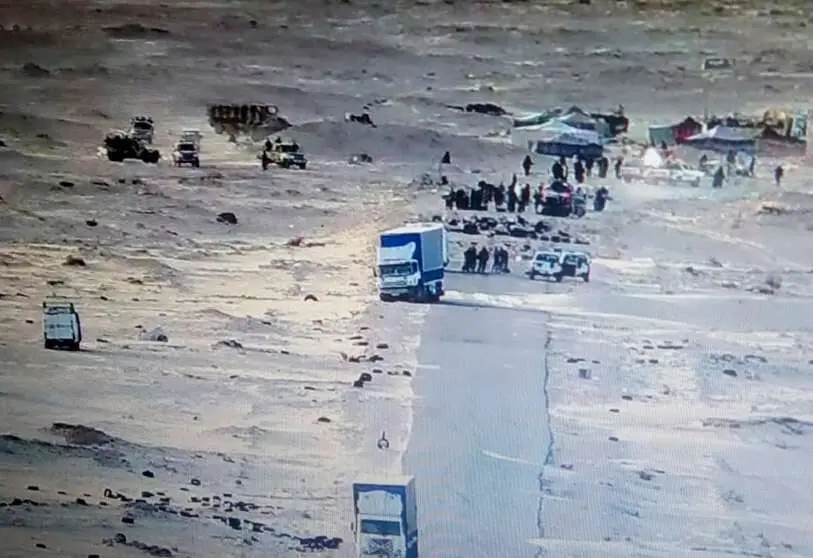Guerguerat: social media and imaginary war

We can count by tens the amount of atrocities that have been read during these last days in social networks, and some digital media, on account of the 25 days in which more than 200 trucks and civilians have been blocked in the Guerguerat pass, bordering Mauritania, and whose unblocking has led to the announcement by the Polisario Front of the end of the ceasefire and declaration of war through various communiqués, which, in turn, are well reported on its social networks, being compulsively shared by its acolytes with scarcely any confirmation of their veracity.
These communiqués detail the presumed warlike actions they are carrying out against the Moroccan army. They even dare to make daily maps that they themselves call "war reports", where they point out the alleged attacks. The reality is that, beyond the border being unblocked by restoring public order in a small skirmish, no doubt sought by the Polisario, in this era of disinformation, post-truth and 'fake news', the war seems to be more in the social networks, in some related media, or in the imagination and desire of some, than on a real battlefield.
Let's go a step further, because it seems that more than one spends too much time playing video games. For example, a Twitter user called Rashid published a spectacular night-time combat video with tracer shells, probably taken from some Middle Eastern war in the past, while confirming the victory of the Polisario militias after that battle. Another user stated, through different photos taken from who knows where, attacks with BM-21 Grad rockets. A third, who calls himself Dani, dares to state on Facebook that 120 Toyota 'pick-ups', 80 Hummers and 130 soldiers have been captured, causing 15 deaths in the Moroccan ranks, for only five wounded by the Polisario. A story almost taken from The Alamo or from The Charge of the Light Brigade.
Some digital media have not been left behind either, most of them, such as those related to the Polisario. Some speak of 72 Moroccan hostages captured, while others speak of four dead soldiers. The last boutade with unconfirmed images was to read that "special commandos break into Sahrawi homes. Dozens of youth have been arrested, mistreated and tortured by the Moroccan occupation forces conducting a campaign of mass arrests". What is true in all this story? Who knows? At the height of the delirium, even Moroccan Dina Bousselham, a Podemos follower, openly supports the Polisario. She is one of the many politicians who have come to the fore these days, to discuss this issue, without having the slightest idea of what was going on 'on the ground'.
Unfortunately, some of the digital media in Spain have also taken part in this absurdity, making all kinds of statements such as those described above with grandiloquent headlines. Even on Twitter, in an outburst of brazenness and malpractice, some of them, in an absurd mixture - while supporting the Polisario and leader Brahim Ghali - have dared to link this hypothetical war situation with the migration crisis and the massive arrival of boat people to the Canary Islands' coasts, seasoned with an alarmist text, exclamations and emoticons, as we usually receive on every day WhatsApp. "Beware of false knowledge; it is more dangerous than ignorance." Mostly when hiding behind a keyboard.
This is precisely the scenario in which belligerent Ghali and the leaders of the Polisario wanted to meet, that of creating a low-intensity conflict - not to say non-existent or quasi-fictitious - in which they have nothing to lose, to rekindle the flame of the dispute on the internet, and to emerge from the ostracism they have created on their own merits and inability, all with the consequent media focus and headlines. First, the Guerguerat's conspiracy is provoked, and then the networks are "shaken out of the nest", making supporters to believe in the veracity of the escalation of the war without providing any evidence, and emerging from their international invisibility on the basis of lies or half-truths, putting peace and stability in the area at risk.
The assault on the Moroccan Consulate General in Valencia is the first toll to be paid, we will see what the next one is if no action is taken and if prudence does not prevail, not only on the ground, but also in terms of information. To this end, in the absence of truthful and contrasting news, any type of information of dubious origin must be banished, where photos and videos are massively used, giving way to the consequent disinformation in the form of hoaxes. This is the true pandemic of the 21st century, and some people take advantage of it, as in the case we are dealing with here.
Meanwhile, Morocco denied that the clashes with the Polisario Front in the past few days had claimed any lives, while minimising the attacks by describing them as mere "harassment" and "provocation". They are certainly not interested in getting involved, even if the networks' fiction wants to show the opposite. The normal and responsible thing to do in a case like this is to wait for news from agencies, media and reliable sources, fleeing from the cesspool that is social media at times. Please, be careful.

